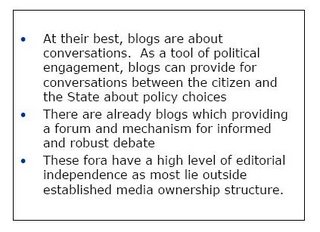State reformation
Perhaps this is what Tony Blair meant when he described his recent time in office as 'the most productive so far' in his interview last week with Jon Sopel on the BBC's Politics Show. ("I think in many ways actually, the last eighteen months has been our most radical, most bold on the domestic agenda.") And on Yesterday's Today show on Radio 4, he told John Humphrys that Labour 'still had to do more to address the growing wealth gap and improve "social mobility," particularly for the "10% at the bottom".'
(In the same interview he also said it would "not be very democratic" to stand down earlier than he had planned. Hold the front page! TB cares about democracy? *Drums fingers, waiting for referendum on Iraq...*)
So, back to the state reformation. It's a fascinating document and sets out clearly the changing role of the state over the past century. I was especially interested in the importance given to 'changing social attitudes': the document certainly gives more weight to public opinion than I thought mattered to the Powers That Be, 'decreasing deference' being a term used several times throughout.
So the state recognises very well that the nature of power and authority is changing and seeks to re-position itself accordingly. How? By sticks and carrots, of course. The only way it knows how; the only way it can, given that it is a body of power, in a position of authority. The old way, that it admits hasn't been working recently. ("We are increasing autonomy for good providers." Someone show them a dictionary: autonomy isn't something that can be bestowed by increments, with conditions attached.) They're just planning to get more determined and devious about it.
More public consultations... "The citizen is beginning to be viewed as a partner in decision making." Beginning? Erm.. isn't democracy supposed to mean that we always were? And the state is apparently going to be an enabling rather than a providing state.
But the most interesting phrase in the whole presentation is this one: "Growing awareness of the socio-economic consequences of parenting". The socio-economic consequences of parenting. What are these and who has a growing awareness of them and why? And hands up, those parents who felt a chill run down their spine when they read that phrase? I certainly did.
And we apparently have an 'HMT Parenting Fund [which] is managed by the Third sector and gives grants to frontline parenting support organisations'. The use of battle terminology like 'frontline' gives the game away, in my opinion. This is war: a strong state needs weakened family structures. Strong family structures make for a weakened state. This document, and countless others, outline the future incursions and invasions into our territory. 'Interventions', as they're diplomatically known.
Blogs even get a page to themselves:

- though I couldn't help noticing they missed out the sentence beginning "At their worst.." ;-)
So with voter 'apathy' at its height, could concerns about public engagement in debate in the form of the lack of a real mandate for power be the new 'enabling' state's Achilles' Heel? Or, as Richard Littlejohn observed in Tuesday's Daily Mail, talking about the new website set up by the Law Commission to find out which laws the public would like to be changed, would "any idea that the public could have a say in framing laws [be] anathema to those in power"?
This all makes me think, yet again, about the nature of power and how it really works. Hopefully I'll be back with more on this when it occurs to me. I'm certainly planning a powerpoint presentation along the lines of 'The Family Fights Back.' Because it's about time it did.



